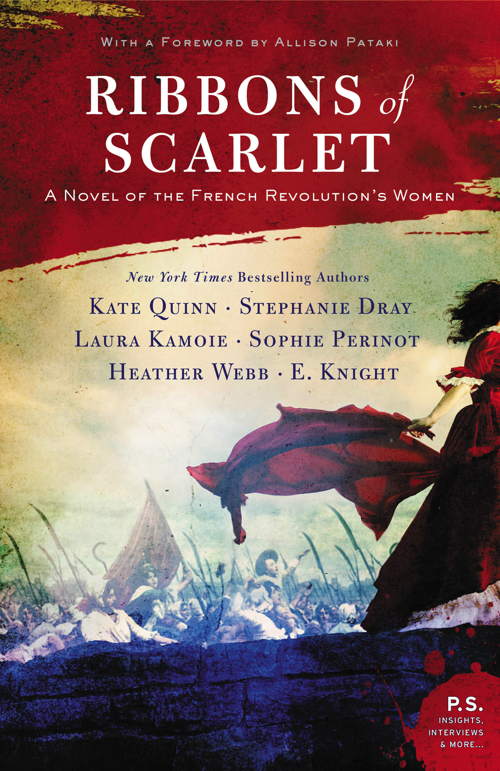Ribbons of Scarlet

A Novel of the French Revolution
Available in ebook, paperback, hardcover, and audiobook
A breathtaking epic novel illuminating the hopes, desires, and destinies of princesses and peasants, harlots and wives, fanatics and philosophers—seven unforgettable women whose paths cross during one of the most tumultuous and transformative events in history: the French Revolution.
Ribbons of Scarlet is a timely story of the power of women to start a revolution—and change the world.
In late eighteenth-century France, women do not have a place in politics. But as the tide of revolution rises, women from gilded salons to the streets of Paris decide otherwise—upending a world order that has long oppressed them.
Blue-blooded Sophie de Grouchy believes in democracy, education, and equal rights for women, and marries the only man in Paris who agrees. Emboldened to fight the injustices of King Louis XVI, Sophie aims to prove that an educated populace can govern itself--but one of her students, fruit-seller Louise Audu, is hungrier for bread and vengeance than learning. When the Bastille falls and Louise leads a women’s march to Versailles, the monarchy is forced to bend, but not without a fight. The king’s pious sister Princess Elisabeth takes a stand to defend her brother, spirit her family to safety, and restore the old order, even at the risk of her head.
But when fanatics use the newspapers to twist the revolution’s ideals into a new tyranny, even the women who toppled the monarchy are threatened by the guillotine. Putting her faith in the pen, brilliant political wife Manon Roland tries to write a way out of France’s blood-soaked Reign of Terror while pike-bearing Pauline Leon and steely Charlotte Corday embrace violence as the only way to save the nation. With justice corrupted by revenge, all the women must make impossible choices to survive--unless unlikely heroine and courtesan’s daughter Emilie de Sainte-Amaranthe can sway the man who controls France’s fate: the fearsome Robespierre.
Part I: The Philosopher
Freedom is the first need of the human heart.
—Sophie de Grouchy, in her Letters on Sympathy
Paris, Spring 1786
Sympathy is our most natural and moral sense. And its origin is pain. From our first wail of infancy, we’re creatures who suffer. Perhaps women most of all. From cradle to grave, we gather bruises, scrapes, and cuts. And all of us—from peasant to queen—stumble and fall.
What’s more, every injury hurts infinitely. First, when the bone breaks. Then again, in every remembrance of it, such that when we see another person in pain, we feel the echo in our own body.
That’s why, blinded by tears, I shuddered with every crack of the hammer over the scene of torture playing out before me in the majestic place de Grève, where a doomed prisoner screamed for mercy as the executioner shattered his bones.
READ MOREI didn’t know the condemned criminal who was strapped to the cartwheel. I didn’t know his family. I didn’t even know if he was guilty. I had no relation to him whatsoever except the most important one—that we were both human beings. But when the executioner raised the steel rod to break the victim’s forearm, I quite nearly prayed for him to miss his mark and kill the man. Let the blow end his suffering. Let the victim’s senses go quickly, like mine were beginning to as I grasped my uncle’s gloved hand to fight off a swoon.
But I didn’t pray, because this suffering to which I bore witness was in the name of the king’s justice, supposedly ordained by a god I didn’t believe existed.
Any god who ordained this would be a devil. And I didn’t believe in devils, either, unless they be men.
“I shouldn’t have brought you, Sophie,” Uncle Charles whispered as, in anticipation of death, black crows gathered on the rooftop of the nearby Hôtel de Ville. “Come away now.”
His voice was a rasp of emotion with an uncomfortable awareness of the peasantry, for whom this horrific spectacle was meant to be both entertainment . . . and a warning. Those peasants bold enough to peek up from beneath dirtied caps to look at me and my uncle seemed to say, You don’t belong here. And perhaps we didn’t. Though I wore only a plain somber gray Brunswick gown unadorned by ribbon or lace, and my uncle was dressed in black, the people knew aristocrats on sight.
They also knew that even minor aristocracy, like my family, would never be made to suffer the torment of being broken upon the wheel, shrieking and begging for a swift death. We had the money and connections to avoid such a fate. The common people knew it and I knew it too.
So I didn’t obey my uncle, but smeared away my tears, forcing myself to watch as the screaming wretch’s bones were shattered, brittle ends breaking through skin, spattering crimson blood on the cobbles. His screams were indescribable, but they seared my soul, and I reminded myself that I was here because of my uncle’s important work—our work, he often flattered me to say . . .Uncle Charles was a magistrate, not a street vendor hawking his wares. But he knew we might be the only chance to end suffering like this, and for that reason he addressed the crowd. “I represent three peasants of Chaumont who’ve been sentenced to die this same way,” he told the knot of people standing nearest. “I authored a defense of them.” I held one of his pamphlets now, crumpled in the tightness of my grip as my uncle raised his voice. “Perhaps you’ve read it . . .”
His words made no impression upon a burly bricklayer who had climbed atop a crate for a better view and cheered every hammer blow. But we’d captured the attention of a fishwife in brown homespun and a young fruit seller in dirtied skirts, basket in hand and tears in her eyes. Neither were likely to have the education that would allow them to read my uncle’s pamphlet, but they’d heard about the three peasants of Chaumont. Oh yes, they’d heard. And word passed.
“It’s Charles Dupaty,” someone whispered. “He’s here.”
My uncle had gained renown (or perhaps infamy) by taking on the case, and more heads turned our way when he shouted, “Three innocent men! Forgotten by our barbaric system of criminal justice, left to rot in prison for thirty months, then condemned without evidence or credible witnesses!”
A priest in the crowd hissed at us, “For shame.”
I did feel shame for using the occasion of one man’s death to draw attention to the plight of three others. The dying man deserved, perhaps, the witness of every person for his suffering. But we couldn’t save him. We could only, if we were lucky, deprive the executioner of his audience and make the end quicker for the dying man.
“If the three peasants of Chaumont were rich men,” Uncle Charles continued, undaunted, “they’d never have been forgotten in jail. Rich men would’ve been able to appeal . . .”
My part, now, was to say what my uncle couldn’t. Ordinarily, it outraged me that the things women said were easily dismissed, but now I wished to take advantage of it. I was just twenty-two. I’d be thought a termagant for speaking about legal matters in public, but not a criminal. So with at least fifty pairs of eyes trained upon us, I found my voice. “But rather than reform a merciless system that celebrates suffering, the Paris Parlement resorts to judicial murder.”
Several men turned with hostile glares. “Good thing you’re a beauty,” one snarled. If I were not a noblewoman on a magistrate’s arm, he would’ve beaten me into silence.
As I swallowed my fear, murmurs in the crowd grew louder, nearly drowning out the screams of the shattered man. Sensing the change, the executioner ended the prisoner’s suffering with the coup de grâce—a blow to the torso that ruptured every organ.
Then all was silent.
The dead body was left upon the wheel, like carrion to be pecked by crows. Some words were chanted about how the criminal’s suffering purged us all of sin. Someone else said a prayer, acknowledging our submission to the king. Then the soldiers commanded us to go . . . but some people sullenly took copies of our pamphlet as they went.
Long after our carriage rolled away, the dead man’s screams still echoed in my ears, and I retched out the window, my sour vomit spattering the cobbled streets of Paris.
“Poor Grouchette,” Uncle Charles said, using my childhood nickname as I fought another wave of nausea. “However brave you are, you’re still a gently bred young lady. Now I fear you may never sleep again.”
“Should I?” I asked with a sob as the horses clopped along. “Should any of us sleep while things like this take place? It seems as if the whole world has closed their eyes to injustice.”
And I wanted to shake the world awake.
But first, I’d have to get hold of myself. Uncle Charles valued rationality not emotion. I feared that if I couldn’t stem my tears, he might trust me less in the great legal matter he’d undertaken at risk to his career and our family reputation. A fear that was confirmed when he pressed into my palm a silver flask of brandy with which to rinse my mouth and said, “I think it’s time you bow to the wishes of your parents.”
“Oh, not that again, not now,” I pleaded, taking a gulp to cleanse my tongue.
I’d just seen a man die. It was obscene to speak of my future when the executed man had none.
My parents wanted me to marry—a fate I dreaded. In helping my uncle with his practice of the law, I’d learned the myriad ways in which husbands abused their power. And even if I were ignorant of that, there remained the regrettable reality that my heart already belonged to a young man I could never marry.
A good and brave soldier who risked his life, fortune, and freedom in the cause of liberty. But because my love was a shameful secret, I only said, “You know I’ve no wish to take a husband, Uncle. I’m much happier to devote myself to our causes like a nun to Christ.”
My uncle managed a small smile, perhaps remembering the family row when I renounced my faith. My kindhearted mother had sobbed against her rosary beads. My father, the Marquis de Grouchy, barked, “I’ll have no godless girl under my roof!”
Only Uncle Charles took my part in the matter.
Sophie is special, he’d argued. She consumes Rousseau and Voltaire like breathing air. She’s conversant in every subject. Let her leave off the prayer beads, the embroidery, and other feminine occupations. Sophie is a scholar with a man’s mind.
Of course, I didn’t feel as if I were a man in body or mind. And I believed other young ladies would be scholars if only such qualities were prized and encouraged in us. Nevertheless, I didn’t protest against my uncle’s defense, because he’d persuaded my parents to allow me to study with him. If she were a man, I’d take her for a legal apprentice. She’ll be a great help to me . . .
I liked to think I had been a great help to Uncle Charles during the past year while we fought to save the lives of three condemned peasants. I’d fetched books, researched precedents, taken notes, suggested arguments, and carried his writings to the printer. I’d even suggested that he sell his pamphlet, the funds for which might be used for the benefit of the prisoners.
I truly believed we’d save them.
But now in the carriage beside me Uncle Charles said, very gravely, “It’s not going to end well, Sophie. My clients will likely die upon the wheel, just as that man did today, and it’ll likely be the last case I ever take.”
“You can’t mean it,” I said. “Every day we’re overwhelmed by pleas to help other unfortunates condemned by the king’s so-called justice.”
Even if we didn’t save our three prisoners, we might still make a difference. Not just through charity but by opening the public’s eyes. That’s what my uncle had said at the start, but now he took the wig from his head and rubbed at his thinning gray hair. “I have reason to believe the judges of the Paris Parlement will retaliate against me.”
That hardly seemed fair since my uncle’s pamphlet hadn’t accused any judge of corruption. He’d merely pointed out the unfairness in the system of the ancien régime. “They’ll see reason,” I argued. “They’re learned men. They can learn to see the humanity of peasants and a kinder way of justice.”
“My darling niece, were your passion alone to count upon the scales of justice, France would be a better nation. But I can no longer shield you from the expectations of society. I’ve brought the king’s disapproval down on the family name. It will be up to you to redeem it with a brilliant marriage.”
I didn’t see how my marriage—brilliant or otherwise—would do anything for the Grouchy name, considering that I’d have to give it up. The family hopes more properly rested upon my brother, the heir to my father’s title. But the lines of worry on my beloved uncle’s face made me wish to give comfort. “I don’t believe you have brought down the king’s disapproval upon us, Uncle Charles. I don’t believe the king knows half the crimes committed in his name while he gorges himself on dainties at Versailles without any concern whatsoever for the people over whom he rules.”
“Be fair-minded,” Uncle Charles chided, as he always did when my passions got ahead of me. I did not like to be strident, but I had, as Maman often told me, an unladylike temper. “King Louis is still relatively young, and those who know him say he’s well-intentioned. He can learn, if he’s well advised. But I’m not enough connected at court to have the king’s ear.”
Neither was my father.
If we wanted to save the lives of the three peasants and save my uncle’s career—not to mention preserve me from an unwelcome marriage—we’d need the support of someone very wealthy and sympathetic to our cause. Someone with the bravery of a lion. Someone both respected by the king and beloved by ordinary people. And of course, at that time, there was only one such man in France.
The Marquis de Lafayette.
The very man with whom I fancied myself so helplessly in love.
COLLAPSEBooklist, Starred Review wrote:"This would be an amazing book at any time, but given this moment in time, it is especially perfect. Read it for the entertainment value, read it for the history, read it for the wonderful tales about these strong, unrelenting, powerful, committed woman. But most of all read it to be inspired. To be reminded of what mere mortals can do when we are determined."
Melanie Benjamin, NYT Bestselling Author of The Aviator's Wife wrote:“An excellent choice for a lively book discussion and readers of historical fiction will appreciate this unique take on an era not often covered in English-language popular fiction.”
Dolen Perkins-Valdez, NYT Bestselling Author of Wench wrote:“HERstory at its finest; this novel of the French Revolution, collaboratively written by titans of Historical Fiction, brings women to the forefront of the time known as The Terror. This novel has it all; the ability to move, entertain, educate, and inspire. We cannot forget these women, now that we’ve discovered them anew through this powerfully written book.”
Martha Hall Kelly, NYT Bestselling Author of Lilac Girls wrote:“Ambition. Heartache. Scandal. Brilliantly executed portrayal of women’s participation in the French Revolution. When the characters crossed paths, the page sparked with tension. Six of your favorite writers writing about six fascinating women. I cannot think of a better way for you to spend your time than reading this book.”
Kristina McMorris, NYT Bestselling Author of Sold on a Monday wrote:“The French Revolution comes alive through the eyes of six diverse and complex women, in the skilled hands of these amazing authors.”
Michelle Moran, author of Madame Tussaud wrote:“Seamlessly interwoven by a dream team of historical authors, Ribbons of Scarlet vividly transported me to the tumultuous days of the French Revolution... this timely masterpiece is sure to inspire both courage and caution. A spellbinding read from beginning to end.”
Kris Waldherr, author of Lost History of Dreams wrote:"The French Revolution as you've never read it before–fast-paced, gut-wrenching, and told through the eyes of women who fought and lived it. RIBBONS OF SCARLET manages to do what few other novels set against this complicated backdrop have–make Revolutionary France both completely accessible and utterly compelling. This is historical fiction at its absolute best!"
“A deeply moving pageturner... Ribbons of Scarlet offers a potent feminist reminder that the more things change, the more they remain the same. Highly recommended.”


















